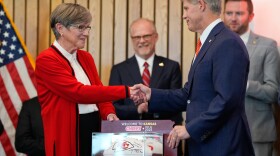When it comes to Kansas universities and the budget, there are winners and there are losers. This report from The Topeka Capital-Journal. A Senate subcommittee took $9.4 million from the budget of the University of Kansas main campus in Lawrence, and gave $7.4 million of it to the KUMC expansion program in Sedgwick County. $2 million must be diverted to medical student scholarships.
Sen. Laura Kelly was the only democrat on the committee. She alone opposed the measure saying it looks like a vendetta.
The panel was led by Sen. Tom Arpke, a Republican from Salina. He says it was necessary in order to support the doubling of medical student enrollment at KUMC in Wichita.
Jeffrey Vitter is the provost and executive vice chancellor of the KU campus in Lawrence. He says the university would have transferred funding to the med center if it was economically feasible. He says the legislative strategy puts one campus against the other.
“Legislators have never acted in this way to interfere in individual university budgets and redistribute between campuses or universities,” says Vitter.
A Kansas Senate subcommittee also recommended cuts for Kansas State University to the tune of $3.1 million. Kirk Schulz is the KSU president. He says that could translate to higher tuition, reduced research and fewer scholarships.
Shulz says, “As the state’s land-grant university, we are charged with reaching every county in the state with programs to assist with the health, education and economic well-being of our citizens.”
He says continued state support is essential to maintaining these programs.







